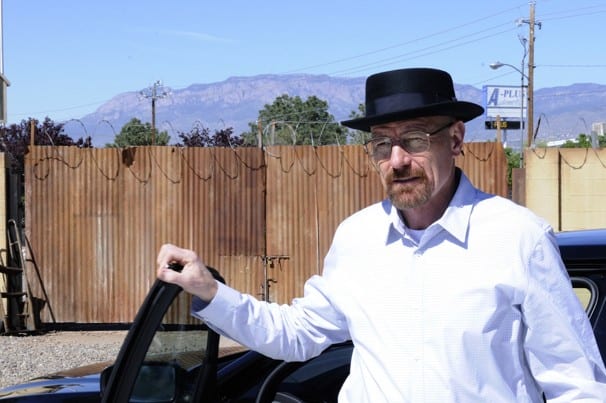
Matthew Perryman Jones has a knack for writing songs that are so unabashedly human, they bear an uncanny resemblance to your own life. Earlier this year he released Land of the Living, his first full-length album since 2008, and filled it with a 10-track marriage of melodies and lyrics that would be enough to earn him a nomination for poet laureate. Here, the singer/songwriter bares all on his new album, losing his dad and recording in a haunted studio (seriously).
What was recording Land of the Living like?
We intentionally wanted to leave Nashville. Not in any sort of jaded way, that we didn’t want to make a Nashville record—I think there are a lot of great records made in Nashville. It was more the idea of just getting out of our own environment into a place that’s unfamiliar that I think in and of itself is going to bring something interesting out. But I think the kind of environment you’re in informs a bit of the process of recording. That’s what I’ve found with this experience. It was my favorite experience recording, ever, and I think it had a lot to do with leaving town and being strictly focused on making a record. It was like we’d come in at 10:00 and work until 5:00 or 6:00. There wasn’t that sort of clock in, clock out mentality. It was really just sort of around the clock creative mindset. We had eight days, so I think that also fed into the urgency. Just realizing that we didn’t have time to sit around and think about it too much. We just had to trust our instinct and trust what came out, and commit to it. Music has a lot to do with being able to commit to something. And the short period of time that we were there helped with that.
What was it like recording away from Nashville?
We recorded in Round Top, Tex. It’s between Austin and Houston in the middle of hill country. It’s really in the middle of nowhere, we had to drive 20 minutes if we needed to get milk or anything. So it definitely felt spacious and sort of what you would imagine Texas being like—just big, opens plains. It was beautiful, really beautiful. It’s basically a ranch that has an old house that was built in the 1800s, and then the barn that we recorded in is an old barn that was built by an Amish community in the 1700s. It actually was built in upstate New York and was transferred down to the ranch and rebuilt. So it really had a cool sense about it. There was something slightly poetic about it. You could see the time that went into making this barn; the axe markings on the beams. That was inspiring, and it seeped into the work we were doing there. The woman who owns the place is a visual artist, so every aspect of the place is just stunning inside. She has these old Egyptian hieroglyphic-type art on the walls, and she’s obsessed with Spanish culture, so she actually has an entire bathroom that’s dedicated to Frida Kahlo. The colors and all of it was just really inspiring. I think it was haunted, and the guy who works there full-time has some crazy stories.
Wait—haunted, haunted?
We had heard stories. The guy who works there all the time, Joshua, had warned us about sleeping in the red house, which is the original barn on the ranch. He just said there was some weird stuff that went on there, and that was about the extent of any kind of reference. We all kind of moved on and got on with our business. There definitely is a vibe about the place. [Our producer] had the first encounter. He was in the kitchen making coffee and he felt like somebody had come up behind him, so he turned around and no one was there. It happened again—he had this overwhelming sense that someone was behind him—but when he turned around, no one was there. Then he heard some foot steps in the next room, so he knocked on the door and no one was in there. But yeah, OK, whatever. Then Tyler, our guitar player, was sleeping the same guest house and woke up at 4:00 or 5:00 in the morning and saw a woman at his door. He said she was dressed in a 1950s outfit, and just instinctively had this sense to call her Sarah. And then towards the end of the week I was sleeping and had a sense of something swirling around [outside], so I sat up and turned the light on. Then I heard these voices. It sounded like a group of women in the woods—and there was nobody. So the next day we tell the stories, and Joshua says: “Well, I didn’t want to tell you guys any details before we started working, but there used to be a woman who lived here…” It wasn’t weird. It just felt friendly—like, “Hey, welcome to the ranch!”
In the song “Angels Were Singing” you’re writing about the loss of your father. Do you ever find it difficult to put such raw emotions into a song?
Yeah, absolutely. This record in particular deals with a lot of directly personal stuff. Other records and other songs … I think there’s always an autobiographical element, even if you’re writing something fictitious I think there’s always something of you that comes out. A song like that is very vulnerable, and it’s hard to release that into the world. But it felt right, and it felt like something I really wanted to sing. Honestly, I think it’s one of the best songs I’ve ever written. Just in the way that a melody and a thought agree with each other. That’s what I hope to achieve in writing, that a melody and a lyric sort of fit together. I think there’s a real insecurity in releasing something so personal because you’re opening yourself up to critics and people who are going to talk about it in an objectifying way. It can sound so weird talking about art … it can sound a bit pretentious … but I think it’s sort of an act of courage to do that.
I had a gentleman at my CD release show who had just lost his father that day. He spoke to my wife and said how meaningful it was for him to hear that song in particular. Honestly, that’s why I make music. I’ve always been fueled by—and through my life it’s been a theme—where I get a letter or an email from somebody saying, “That song that you wrote carried me through a really hard time in my life.” To me, those are incredibly humbling, because you realize the power of something you’ve done or a piece of art and how it can actually accompany somebody through a really significant time in their life. That’s why I want to continue to be somewhat brave in releasing something that’s that vulnerable because I want to believe it’s going to find a place with someone that’s going to be significant.






















